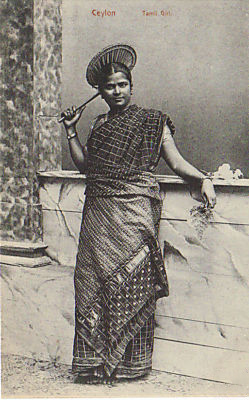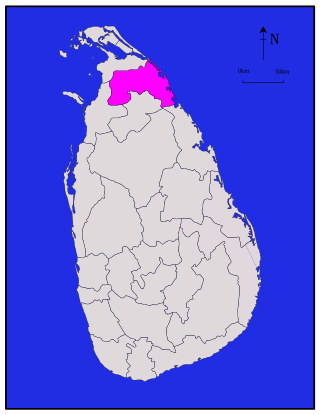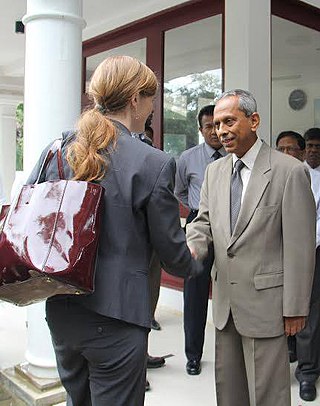Related Research Articles

The president of Sri Lanka is the head of state and head of government of the Democratic Socialist Republic of Sri Lanka. The president is the chief executive of the union government and the commander-in-chief of the Sri Lanka Armed Forces. The powers, functions and duties of prior presidential offices, in addition to their relation with the Prime minister and Government of Sri Lanka, have over time differed with the various constitutional documents since the creation of the office. The president appoints the Prime Minister of Sri Lanka who can command the confidence of the Parliament of Sri Lanka.

The Parliament of the Democratic Socialist Republic of Sri Lanka is the supreme legislative body of Sri Lanka. It alone possesses legislative supremacy and thereby ultimate power over all other political bodies in the island. It is modeled after the British Parliament. The 16th Parliament of Sri Lanka was dissolved on 24 September 2024.

An enforced disappearance is the secret abduction or imprisonment of a person with the support or acquiescence of a state followed by a refusal to acknowledge the person's fate or whereabouts with the intent of placing the victim outside the protection of the law. Often, forced disappearance implies murder whereby a victim is abducted, may be illegally detained, and is often tortured during interrogation, ultimately killed, and the body disposed of secretly. The party committing the murder has plausible deniability as there is no evidence of the victim's death.

Sri Lankan Tamils, also known as Ceylon Tamils or Eelam Tamils, are Tamils native to the South Asian island state of Sri Lanka. Today, they constitute a majority in the Northern Province, form the plurality in the Eastern Province and are in the minority throughout the rest of the country. 70% of Sri Lankan Tamils in Sri Lanka live in the Northern and Eastern provinces.

The Constitution of the Democratic Socialist Republic of Sri Lanka has been the constitution of the island nation of Sri Lanka since its original promulgation by the National State Assembly on 7 September 1978. As of October 2022 it has been formally amended 21 times.

In Sri Lanka, the Cabinet of Ministers is the council of senior ministers responsible and answerable to the Parliament of Sri Lanka. The President is a member of the cabinet and its head.

The Speaker of the Parliament of the Democratic Socialist Republic of Sri Lanka is the presiding officer of the chamber. The Speaker fulfills a number of important functions in relation to the operation of the House, which is based upon the British Westminster parliamentary system. The speaker is second in the Sri Lankan presidential line of succession, after the prime minister.

Akilan Manoharan Ganesan is a Sri Lankan trade unionist, politician and government minister. He is the leader of the Democratic People's Front (DPF) and Tamil Progressive Alliance (TPA), members of the United National Front for Good Governance (UNFGG).
Tens of thousands of people have been disappeared in Sri Lanka since the 1980s. A 1999 study by the United Nations found that Sri Lanka had the second highest number of disappearances in the world and that 12,000 Sri Lankans had disappeared after being detained by the Sri Lankan security forces. A few years earlier the Sri Lankan government had estimated that 17,000 people had disappeared. In 2003 the Red Cross stated that it had received 20,000 complaints of disappearances during the Sri Lankan Civil War of which 9,000 had been resolved but the remaining 11,000 were still being investigated. Amnesty International reported in 2017 that the disappeared persons in Sri Lanka could be between 60,000 and 100,000 since the late 1980s.
The chief justice of the Democratic Socialist Republic of Sri Lanka is the head of the judiciary of Sri Lanka and the Supreme Court of Sri Lanka. Established in 1801, the chief justice is one of ten Supreme Court justices; the other nine are the puisne justices of the Supreme Court of Sri Lanka. The post was created in 1801. The chief justice is nominated by the Constitutional Council, and appointed by the president. The first chief justice was Codrington Edmund Carrington. The current acting chief justice is Murdu Nirupa Fernando.

The 1978 Constitution of Sri Lanka provides for the election of members of Parliament from 22 multi-member electoral districts through the proportional representation electoral system.

Mullivaikal Hospital was a makeshift hospital located in the Safe Zone in northern Sri Lanka. An alleged series of shellings and aerial attacks began on 23 April 2009 when the Mullivaikal Hospital was hit by three artillery shells. It continued on 28 and 29 April when the Mullivaikkal Primary Health Center was hit multiple times over two days with six killed and many injured including one medical staffer. On the 29th and the 30th the Mullivaikal Hospital was again hit multiple times with nine more killed and fifteen injured. There were two attacks against the Mullivaikal Hospital on 2 May, one at 9 a.m. and a second at 10.30 a.m. resulting in sixty-eight killed and eighty-seven wounded, including medical staffers. On the morning of 12 May 2009 it was hit by an artillery mortar, killing at least forty-nine patients and injuring more than fifty others. All of these attacks were allegedly by the Sri Lankan Army; however, the Sri Lankan Government denied the allegation stating there is no evidence.
The Lessons Learnt and Reconciliation Commission was a commission of inquiry appointed by Sri Lankan President Mahinda Rajapaksa in May 2010 after the 26-year-long civil war in Sri Lanka to function as a Truth and reconciliation commission. The commission was mandated to investigate the facts and circumstances which led to the failure of the ceasefire agreement made operational on 27 February 2002, the lessons that should be learnt from those events and the institutional, administrative and legislative measures which need to be taken in order to prevent any recurrence of such concerns in the future, and to promote further national unity and reconciliation among all communities. After an 18-month inquiry, the commission submitted its report to the President on 15 November 2011. The report was made public on 16 December 2011, after being tabled in the parliament.
Local government is the third and lowest level of government in Sri Lanka – after the central government and provincial councils. The local government bodies are collectively known as local authorities. They are responsible for providing a variety of local public services including roads, sanitation, drains, housing, libraries, public parks and recreational facilities.

A kachcheri or district secretariat is the principal government department that administrates a district in Sri Lanka. Each of the 25 districts has a kachcheri.

The Prime Minister of the Democratic Socialist Republic of Sri Lanka is the most senior member of parliament in the cabinet of ministers. It is the second-most powerful position in Sri Lanka's executive branch behind the president, who is the constitutional chief executive. The Cabinet is collectively held accountable to parliament for their policies and actions. The powers and functions of the Prime Minister has changed several times since the creation of the office in 1947.

Hewa Matara Gamage Siripala Palihakkara is a Sri Lankan civil servant, diplomat and former Governor of Northern Province.
Angajan Ramanathan is a Sri Lankan Tamil politician, former provincial councillor and Member of Parliament. He is the current Deputy chairman of committees of the Parliament of Sri Lanka.
The Commission of Inquiry to Locate the Persons Disappeared during the Panchayat Period (1990–1991) is a truth commission established in Nepal in 1990 after the end of the autocratic Panchayat Regime by the first post-Panchayat Prime Minister Krishna Prasad Bhattharai. The commission was set up to examine allegations of human rights violations and inquire about enforced disappearances during the Panchayat system from 1961 to 1990. A report was officially submitted to the government in 1991, but it was made public only in 1994. The commission identified 35 persons disappeared on about one hundred studied cases. However, no alleged perpetrators were judged.
Saliya Pieris, PC is a Sri Lankan lawyer, and former President of the Bar Association of Sri Lanka. Pieris is an Eisenhower Fellow. He is also an alumnus of the Dealing with the Past (DwP) Programme, Switzerland and IVLP, USA. He began his career as a prosecutor in the Attorney General’s Department. Later, he served as the First Chairman of the Office on Missing Persons from February 2018 to September 2020, which was created as part of Sri Lanka's reconciliation mechanism. Additionally, he was also a Member of the Human Rights Commission of Sri Lanka between October 2015 and March 2018.
References
Citations
- 1 2 3 Sunday Times 2018.
- 1 2 3 4 Daily News 2018.
- ↑ Parliament of the Democratic Socialist Republic of Sri Lanka 2016, pp. 1.
- 1 2 Secretariat for Coordinating Reconciliation Mechanisms 2018.
- 1 2 3 Ministry of National Integration & Reconciliation 2018.
- 1 2 The Hindu 2018.
- ↑ Sri Lanka Brief 2017.
- 1 2 3 4 5 6 Asian Tribune 2018.
- ↑ Parliament of the Democratic Socialist Republic of Sri Lanka 2016, pp. 171.
- ↑ Parliament of the Democratic Socialist Republic of Sri Lanka 2016, pp. 3.
- ↑ Parliament of the Democratic Socialist Republic of Sri Lanka 2016, pp. 15.
- ↑ Parliament of the Democratic Socialist Republic of Sri Lanka 2016, pp. 6.
Bibliography
- "Sri Lankan govt. launches Office of Missing Persons". The Hindu. 1 March 2018. Retrieved 11 December 2018.
- "Office on Missing Persons (OMP) Commences Operation | Asian Tribune". asiantribune.com. Asian Tribune. Retrieved 11 December 2018.
- "OMP: the Facts". Secretariat for Coordinating Reconciliation Mechanisms. Retrieved 11 December 2018.
- "Office on Missing Persons (OMP)". nirmin.gov.lk. Ministry of National Integration & Reconciliation. Retrieved 11 December 2018.
- "Sri Lanka: Office of Missing Persons to be operational from 15th this month. | Sri Lanka Brief". Srilankabrief.org. 13 September 2017. Retrieved 11 December 2018.
- Imtiaz, Zahrah (1 March 2018). "Saliya Peiris to head OMP Office". Daily News. Retrieved 11 December 2018.
- Parliament of the Democratic Socialist Republic of Sri Lanka (23 August 2016). "Office on Missing Persons (Establishment, Administration and Discharge of Functions) Act, No. 14 of 2016" (PDF). The Gazette of the Democratic Socialist Republic of Sri Lanka.
{{cite journal}}: Cite journal requires|journal=(help) - "Office of Missing Persons". Secretariat for Coordinating Reconciliation Mechanisms. Retrieved 11 December 2018.
- "President appoints commissioners to Office of Missing Persons". Sunday Times. Retrieved 11 December 2018.